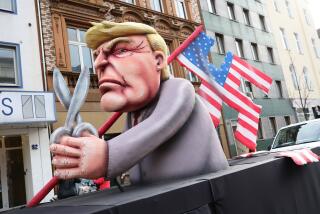Snub Strengthens Strongman
- Share via
Already Asia’s leaders can’t wait for next year’s Asian economic summit in New Zealand. The one in Malaysia last week was a disaster, and it came at a time when a serious Asia-Pacific Economic Conference meeting to deal with the complex issues of the financial crisis was desperately needed. But the best thing about the recent political carnival in Kuala Lumpur is that it’s over.
Of course, who in the United States cares much about Malaysia, a country of a mere 20 million somewhere in Southeast Asia? Why fret that the vice president of the United States, filling in at an Asian economic summit for an Iraq-engaged President Clinton, all but spat in the face of the summit’s host, Malaysian Prime Minister Mahathir Mohamad? It’s possible to argue that America is so strong, it doesn’t have to care about anything. But Asia is vital to U.S.long-term interests. And Malaysia, though its economy is roughly the size of a mere Portugal, is a bigger U.S. export customer than Australia or France. It is at the heart of a modernizing Southeast Asia that bodes to bridge East and West: Malaysia is a largely Muslim society practicing the kind of moderate Islam that America must respect if it is going to have good relations with any Muslim-majority countries at all.
What exactly was Vice President Al Gore’s mistake? From the podium of an official dinner, hosted, of course, by Mahathir, Gore foolishly compared the reformasi, or democracy demonstrations in Malaysia, to those now dividing violence-wracked Indonesia. As if that weren’t enough, he then praised “the brave people of Malaysia” for standing up to the current government. Now, nobody is going to propose Mahathir for the Nobel Peace Prize. He’s a strong-willed leader who doesn’t much cotton to dissent that personally threatens him; he recently outraged the world, including Asia, by throwing his long-time deputy, Anwar Ibrahim, in jail when it looked like his 17-year rule was about to be challenged. In fact, in Kuala Lumpur, sentiment among the Asian heads of state was running against Mahathir, known infamously in the West for claiming that Jewish speculators were behind Asia’s currency deterioration.
But after Gore, speaking for the Clinton administration, unleashed his mouthboat diplomacy, sentiment in the room swung to Mahathir. In Asia, if not elsewhere, you just don’t go to someone’s home for dinner and criticize the hosts for the way they bring up the children.
Inept U.S. diplomacy in Asia thus transformed the prime minister from heavy-handed tyrant to just another Asian patriot verbally victimized by holier-than-thou American politicians. Asia noticed. “Put down the megaphone,” advised an angry Japan Times in an editorial criticizing Gore but reflecting Japan’s growing irritation with U.S. preaching in general. Noted Australian Prime Minister John Howard: “You don’t necessarily achieve desirable outcomes by constantly hectoring other nations.” But perhaps it was Hong Kong real estate tycoon Ronnie Chan, who offered me his caustic view, who best captured Asian cynicism about lectures by U.S. politicians. “Once again, Gore is speaking to someone in Des Moines, not to the international community. This is yet another example of how foreign policy is sacrificed for domestic electoral consumption.”
To be sure, Asian politicians are sometimes guilty of the same gambit, with their demagoguery against America. But with nearby Indonesia’s casualties from street violence on the increase and Malaysia itself enduring political demonstrations, Gore’s blithe endorsement of such anti-government activity seemed egregiously more indelicate and ill-timed than, say, Clinton’s endorsement in July of Hong Kong’s nonviolent pro-democracy forces.
It would be tragic if America’s big mouth wound up hurting Anwar, the putative beneficiary of Gore’s clumsy intervention. Three months ago, after Anwar was arrested, a senior administration official in Washington explained that to take up Mahathir’s cause publicly could backfire badly: “Of course we want to help Anwar but Anwar is already viewed in Malaysian circles as too pro-Western, almost a co-conspirator with the U.S. But we can get more done for him by keeping our head down and our mouth shut and working other angles.”
What about Mahathir? Sure, he is a strongman in the willful Asian tradition, but he has done much for his country, once a pathetically impoverished British colony. For all his flaws, he will be treated in Asian history books as the man who invented the formula for Malaysia’s modernization. And what will be America’s place in those same history books? Will it be seen as Asia’s respectful partner, working hand in hand to shape our common Asia-Pacific destiny? Or as a muscle-bound crackpot superpower with little more than cruise missiles for brains and a knee-jerk response to cultures and regimes that don’t do things exactly as we want? America’s goring of Mahathir now has Asia believing that the ugly American is rearing his head once again. The American people deserve better diplomacy in Asia than this; so do Asians.
More to Read
Sign up for Essential California
The most important California stories and recommendations in your inbox every morning.
You may occasionally receive promotional content from the Los Angeles Times.










